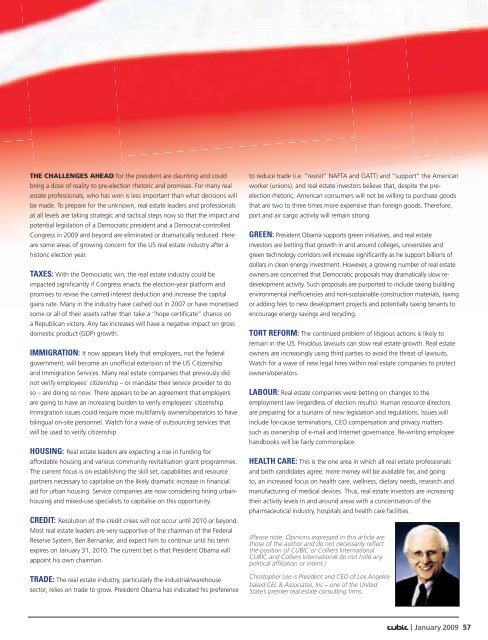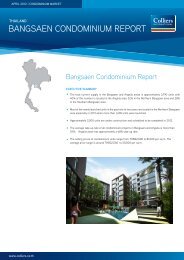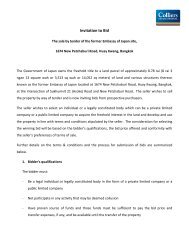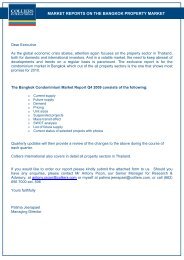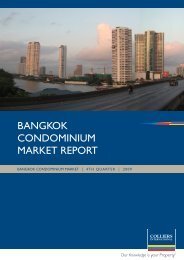CUBIC CoverDec08.indd - Colliers
CUBIC CoverDec08.indd - Colliers
CUBIC CoverDec08.indd - Colliers
Create successful ePaper yourself
Turn your PDF publications into a flip-book with our unique Google optimized e-Paper software.
THE CHALLENGES AHEAD for the president are daunting and could<br />
bring a dose of reality to pre-election rhetoric and promises. For many real<br />
estate professionals, who has won is less important than what decisions will<br />
be made. To prepare for the unknown, real estate leaders and professionals<br />
at all levels are taking strategic and tactical steps now so that the impact and<br />
potential legislation of a Democratic president and a Democrat-controlled<br />
Congress in 2009 and beyond are eliminated or dramatically reduced. Here<br />
are some areas of growing concern for the US real estate industry after a<br />
historic election year.<br />
TAXES: With the Democratic win, the real estate industry could be<br />
impacted significantly if Congress enacts the election-year platform and<br />
promises to revise the carried interest deduction and increase the capital<br />
gains rate. Many in the industry have cashed out in 2007 or have monetised<br />
some or all of their assets rather than take a “hope certificate” chance on<br />
a Republican victory. Any tax increases will have a negative impact on gross<br />
domestic product (GDP) growth.<br />
IMMIGRATION: It now appears likely that employers, not the federal<br />
government, will become an unofficial extension of the US Citizenship<br />
and Immigration Services. Many real estate companies that previously did<br />
not verify employees’ citizenship – or mandate their service provider to do<br />
so – are doing so now. There appears to be an agreement that employers<br />
are going to have an increasing burden to verify employees’ citizenship.<br />
Immigration issues could require more multifamily owners/operators to have<br />
bilingual on-site personnel. Watch for a wave of outsourcing services that<br />
will be used to verify citizenship.<br />
HOUSING: Real estate leaders are expecting a rise in funding for<br />
affordable housing and various community revitalisation grant programmes.<br />
The current focus is on establishing the skill set, capabilities and resource<br />
partners necessary to capitalise on the likely dramatic increase in financial<br />
aid for urban housing. Service companies are now considering hiring urbanhousing<br />
and mixed-use specialists to capitalise on this opportunity.<br />
CREDIT: Resolution of the credit crises will not occur until 2010 or beyond.<br />
Most real estate leaders are very supportive of the chairman of the Federal<br />
Reserve System, Ben Bernanke, and expect him to continue until his term<br />
expires on January 31, 2010. The current bet is that President Obama will<br />
appoint his own chairman.<br />
TRADE: The real estate industry, particularly the industrial/warehouse<br />
sector, relies on trade to grow. President Obama has indicated his preference<br />
to reduce trade (i.e. “revisit” NAFTA and GATT) and “support” the American<br />
worker (unions), and real estate investors believe that, despite the preelection<br />
rhetoric, American consumers will not be willing to purchase goods<br />
that are two to three times more expensive than foreign goods. Therefore,<br />
port and air cargo activity will remain strong.<br />
GREEN: President Obama supports green initiatives, and real estate<br />
investors are betting that growth in and around colleges, universities and<br />
green technology corridors will increase significantly as he support billions of<br />
dollars in clean energy investment. However, a growing number of real estate<br />
owners are concerned that Democratic proposals may dramatically slow redevelopment<br />
activity. Such proposals are purported to include taxing building<br />
environmental inefficiencies and non-sustainable construction materials, taxing<br />
or adding fees to new development projects and potentially taxing tenants to<br />
encourage energy savings and recycling.<br />
TORT REFORM: The continued problem of litigious actions is likely to<br />
remain in the US. Frivolous lawsuits can slow real estate growth. Real estate<br />
owners are increasingly using third parties to avoid the threat of lawsuits.<br />
Watch for a wave of new legal hires within real estate companies to protect<br />
owners/operators.<br />
LABOUR: Real estate companies were betting on changes to the<br />
employment law (regardless of election results). Human resource directors<br />
are preparing for a tsunami of new legislation and regulations. Issues will<br />
include for-cause terminations, CEO compensation and privacy matters<br />
such as ownership of e-mail and Internet governance. Re-writing employee<br />
handbooks will be fairly commonplace.<br />
HEALTH CARE: This is the one area in which all real estate professionals<br />
and both candidates agree: more money will be available for, and going<br />
to, an increased focus on health care, wellness, dietary needs, research and<br />
manufacturing of medical devices. Thus, real estate investors are increasing<br />
their activity levels in and around areas with a concentration of the<br />
pharmaceutical industry, hospitals and health care facilities.<br />
(Please note: Opinions expressed in this article are<br />
those of the author and do not necessarily reflect<br />
the position of <strong>CUBIC</strong> or <strong>Colliers</strong> International.<br />
<strong>CUBIC</strong> and <strong>Colliers</strong> International do not hold any<br />
political affiliation or intent.)<br />
Christopher Lee is President and CEO of Los Angelesbased<br />
CEL & Associates, Inc – one of the United<br />
State’s premier real estate consulting firms.<br />
| January 2009 57


